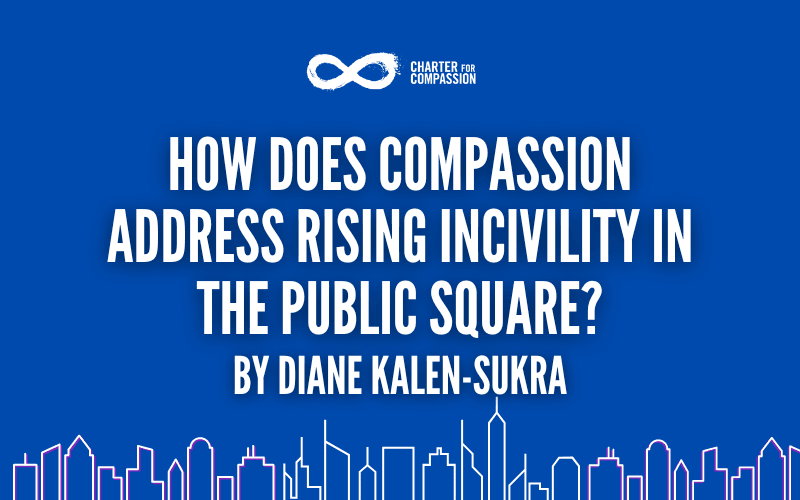
Six years ago, I left my career as a municipal chief administrative officer to sound the alarm on what I had experienced as the rampant spread of incivility and toxic culture in communities, the threat it posed to local democracy, and the well-being of all—most urgently those serving in local government.
First, I wrote a book about it titled, Save Your City: How Toxic Culture Kills Community & What To Do About It then I embarked on a civility tour of communities that has not ended to this day.
Why has this civility tour not ended?
Because incivility and toxic behaviour, once unleashed, spreads like a contagion—unless it is intentionally countered.
I’m reminded of the words of Eleanor Roosevelt. Universal human rights, she says, cannot be guaranteed if respect for the dignity of others is not lived out locally—in our homes, neighborhoods, and communities.
This requires intentionality. A compassionate city, after all, is made up of people who choose to be compassionate. These are people who choose to say “no” to incivility and the mistreatment of others, including civic officials and staff.
To learn more about on-the-ground realities of the ways that rising incivility and toxic culture is impacting local governments and communities, tune in to this week’s in-depth discussion I had with host Chris Eddy of the Local Government News Roundup Unfiltered podcast, broadcasting to global civic leaders from Australia. We compare realities in numerous countries.
Communities that are more civil; where there is greater care and compassion between neighbours; and, a healthy productive relationship between citizens and residents with their elected local government officials, experience better local governance and well-being. I highlight how San Antonio Mayor Ron Nirenberg’s compassionate integrity civic education initiative is an exemplary step on the path to civic culture renewal.
During my first keynote on this topic of the threat that rising toxic culture posed to communities in 2018 in Canada to a conference room of civic leaders, there was significant disbelief that the country had a widespread incivility problem—some even laughed off the idea that unchecked insults or harassment could escalate into threats or violence in Canada.
A couple of weeks ago the mayor of Quebec’s fourth largest city, Gatineau abruptly resigned her post, citing a hostile political climate, including death threats. She is joined by nearly 800 local government elected officials in the province who have resigned since 2021. Quebec Mayors and councillors are now calling for a cultural shift involving citizens, the media and elected officials themselves.
Last month, one of Canada’s longest serving mayors announced to the media that “civility in politics” is worse than at any point in his 36 years in office and that it was “damaging” the country. On police direction, he didn’t bring his car to city hall for a year, because it was not deemed safe.
Today, we are in the absurd position of elected officials and local governments everywhere having to erect costly security protocols and systems to protect themselves and civic infrastructure from the very people they serve—their neighbors.
What is the impact of this toxicity in the public square on local democracy?
A new U.S. report titled “Threat to Local Democracy: Intimidation of State & Local Officeholders” serves as a bellwether. It found that 40 percent of local officials are contemplating not running for re-election, due to the rising abuse and intimidation. An equal percentage of officials are steering clear of contentious issues and limiting their public engagements over concerns for their safety. It further reports that this trend disproportionately affects women and people of colour, who endure a greater share of the abuse. The implications are clear: this pattern significantly hampers the diversity of individuals, viewpoints, and potential solutions in our public discourse.
Senior staff as well as front line civic workers are encountering escalating harassment and abuse, which is not only diminishing productivity and service delivery but also exacerbating the difficulties municipalities face in attracting and keeping qualified staff amidst a wave of retirements.
There are an increasing number of people in our communities, including some civic leaders, who believe that “might is right”, “politics is war” or even that threats, intimidation and even violence can be justified. These authoritarian values fly in the face of the civic spirit supporting thriving democracies.
A casualty of this toxic behaviour is a decline in trust in our public institutions and in each other. This weakens our ability to collaborate and cooperate to solve the tsunami of complex challenges our local governments face, from infrastructure deficits to homelessness.
What steps can we take to reverse the tide of declining civility and eroding trust?
While the road to civic culture renewal is multifaceted and includes collective action, it starts with individual responsibility:
- Choose to be civil. Compassionate people stand up for others, rather than stand by. Engage with others with empathy and respect, fostering an environment where diverse voices are shared, heard, and valued. Compassionate people respect the dignity of others and oppose incivility, intimidation, and abuse in all its forms. In this way, we ensure such behaviors find no foothold in our communities.
- Elect civil & compassionate people. Remember that our decisions at the voting booth have the power to shape the tone of public discourse and effectiveness of local governance. Don’t miss the opportunity of this election years. Elect civic leaders who not only profess and practice respect, civility, and compassion for others.
These are just a couple of the critical steps you can take on the Roadmap for Civic Renewal outlined in “Save Your City: How Toxic Culture Kills Community & What to Do About It”.
Stay connected with award-winning author, speaker and leading culture transformation expert Diane Kalen-Sukra by joining her on LinkedIn, Instagram or Twitter. Visit her website at DianeKalenSukra.com.
Sign up for Diane’s newsletter Civic Wisdom where timeless principles and modern insights are shared for current and aspiring leaders.
Watch the Charter for Compassion’s Global Book Read of Save Your City with author Diane Kalen-Sukra and host Lisa Berkely.


